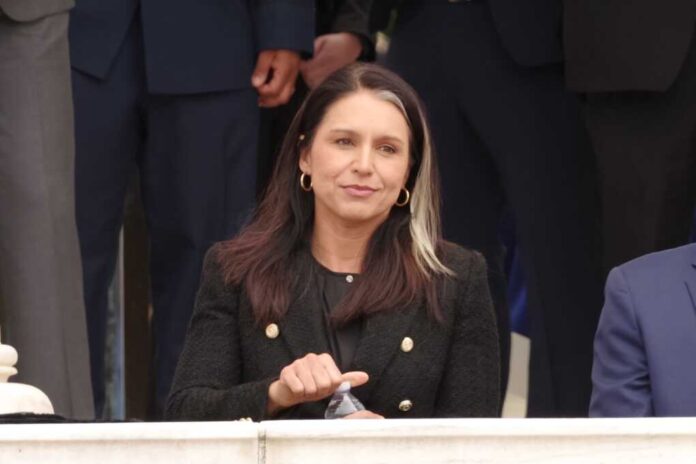National Intelligence DRAMA: Gabbard vs. Obama

What if the Russia collusion investigation was a political scheme all along? The latest revelations from Tulsi Gabbard might just be the beginning of unraveling a scandal bigger than anyone imagined.
At a Glance
- Tulsi Gabbard, as Director of National Intelligence, releases declassified documents challenging the legitimacy of the Russia collusion investigation.
- Documents suggest the Obama administration deliberately politicized intelligence to undermine Trump’s 2016 victory.
- The Department of Justice and FBI are reviewing the declassified materials for potential criminal implications.
- Public debate intensifies over the motivations and validity of the original Russia investigation.
Unmasking the Russia Collusion Hoax
The declassification of key documents by Tulsi Gabbard, the current Director of National Intelligence, is sending shockwaves through Washington. These documents, related to the Russia collusion investigation, allegedly reveal a deliberate attempt by the Obama administration to use intelligence for political gain. According to Gabbard, the materials show that intelligence was manipulated to undermine Donald Trump’s 2016 election victory. This revelation is stirring a hornet’s nest as the nation grapples with the potential misuse of power and trust placed in intelligence agencies.
The documents, declassified in July 2025, include assessments from the Intelligence Community stating that Russia was “probably not trying … to influence the election by using cyber means.” This assessment, made prior to the 2016 election, contradicts the narrative pushed post-election by Obama and his national security team. The team, which includes notable figures like James Clapper and John Brennan, is accused of creating a false intelligence narrative to delegitimize Trump’s presidency.
The Players and Their Stakes
Tulsi Gabbard is at the forefront, advocating for transparency and accountability. Her actions have opened a Pandora’s box, challenging the credibility of former President Obama and his national security team. The Department of Justice and the FBI now hold the responsibility of evaluating the criminal implications of these disclosures. Meanwhile, the intelligence community’s reputation hangs in the balance, with potential legal and reputational repercussions for former officials.
Critics argue that Gabbard’s revelations are politically motivated. However, supporters see this as validation of long-held suspicions about the politicization of intelligence. The power dynamics are shifting as Gabbard and the Trump administration push for a reevaluation of the past administration’s actions.
Impact and Repercussions
The immediate fallout from these revelations is a deepening of the political divide. Renewed scrutiny on the Obama administration could lead to legal investigations and a reshaping of the public’s understanding of the 2016 election. In the long term, these developments might erode public trust in intelligence agencies, leading to calls for reform and increased oversight.
The broader implications stretch beyond politics. There’s a risk of heightened public skepticism toward government institutions, fueling further distrust in media and political figures. While the economic impact may not be direct, the political instability could influence market perceptions and voter sentiment in upcoming elections.







